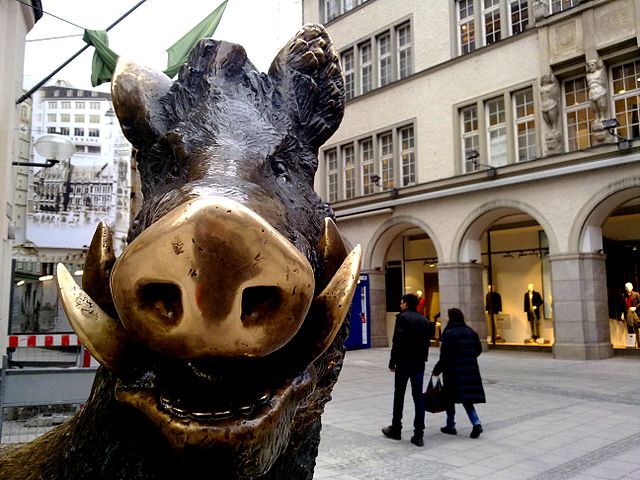To move to Munich, I had to travel almost 7,000 km. Upon arrival, I was immediately confronted with learning a new language and navigating a strange land. But moving just 10 kilometers out of the city triggered culture shock in my husband. Why?
We had to give up our Munich license plate.
Silly man! We’re only a few kilometers beyond the Munich city line and the train station is just down the street. Hop on, crack open a book and voilà! Before you’ve gotten through chapter one, you’re in the Munich city center. It’s just a 25-minute ride.
M is for Munich
But despite being so close to the city, we’re not in it anymore. We’re in a suburb. Our license plate no longer says “M” for München, a name which translates to “near the monks” who founded and dominated the city for centuries. Many original monasteries and churches remain, some now masquerading as museums, such as the Jagd- und Fischereimuseum, the Hunting and Fishing Museum. Where once Augustinian monks bowed their tonsured heads in prayer, furry heads of deer shot by Bavarian noblemen are lined up, looking down with glassy eyes at passing tourists.
Apparently after an 800-year-run, monking was no longer profitable, prompting the city to turn the church into a museum.
EBE is for boar
Not only is the wild boar emblematic for this Munich museum, it also inspired the county name of our new home, Ebersberger Landkreis, which translates as Boar Mountain County. Its first three letters, EBE, are featured on our new license plate. In a sense, then, my husband was correct in fearing our new home would be…boaring.
Now that I’ve translated the county name, I’m beginning to understand a little bit better why he is so upset.
Apart from the solemn grandeur of churches and monasteries, Munich, home of the monks, is also the city of dukes, a couple of kings, stately palaces – and the raucous Oktoberfest, of course. Our town, by contrast, is called Zorneding. I was proud of this name when we first moved, thinking it came from a combination of the onomatopoetic German word for angry – Zorn – and thing – Ding. Zorneding. Grrr!
Now that’s a cool name for a town: angry thing. Spunky, sassy, smart-alecky. Yes! This is the town for me. Make way folks, ‘cause sassy girl is movin’ in!
Unfortunately, the town’s name means nothing of the sort. It derives from the word zerren, in this case with an obsolete meaning: to clear, indicating that the town is a clearing in the forest.
So now I’m faced with the fact that we went from living in “that cool, trendy place where the monks sojourned” to “the spot where some guy looked around, pulled out a hatchet and chopped down some trees.”
I don’t like where this is going.
But wait! There’s more. A sign at the entrance to the town commemorates “1200 years of Zorneding.” It was founded in 813.
Take that, Munich! You only date back to 1158. Put that in your incense burner and give it a good smokin’. Turns out that Charlemagne was sipping coffee and roasting marshmallows at the campfire when Zorneding was founded.
But what am I saying? There was no coffee in Europe back then. And marshmallows? Maybe not.
It’s pretty obvious anyway what the King of the Franks was roasting on that fire: Frankfurters.
That’s so far in the past that there was no Germany or France, just “the kingdom of Charlemagne.” Both Germany and France claim this king as their own, which in a way, he was. So he’s both Karl der Grosse and Charlemagne.
Reinvigorated by the impressive age of my new town, I was quickly disheartened to learn that a bomb had been dropped on the town center on April 30, 1945, just one week before the war ended. It destroyed nearly everything including the town’s archives. The only thing remaining from the town’s former glory are St. Martin’s church from the 18th century and Die Alte Posthalterei, a hotel and restaurant that served as a mail stop on the way from Salzburg to Munich.
And if you must know, yes, Mozart and his sister Nannerl spent the night there. You can enjoy a fine Bavarian meal in a rustic setting, all the while imagining Wolfgang sitting at your table, whistling an aria from the Magic Flute while digging into his dumplings.
Then again, is that really a claim to fame? Mozart spent most of his life in carriages bumping around Europe. It would be more astounding to find a place that he did not pass through on his way to perform for some prince, duke or king or direct the premiere of one of his operas.

But wait! There’s still more.
My small town predates even Charlemagne. Graves from the sixth century were found during building construction – a few even on top of one another, indicating a settlement that was inhabited over a longer period. Who cares if the three letters on our license plate give away that we are not from a big city.
In the end, I’m content here. The grocery store, post office and bakery are all a stone’s throw from our apartment. There’s even a bar with live music, Café Herzog, at least when there’s no virus.
But for that, we have to wait for omega.
Brenda Arnold
Also interesting:
I tried to escape the Oktoberfest. I failed.
Give us our daily bread, but please let it be German
The Prussian Rock Star in my Wardrobe
Title photo: The boar statue in front of the Deutsches Jagd- und Fischereimuseum in Munich, Michael Eschbaumer

Don’t worry, they won’t be an Omega variant. There can’t be as that one is off-limits. In biology an omega-anything is an extinction-level event.